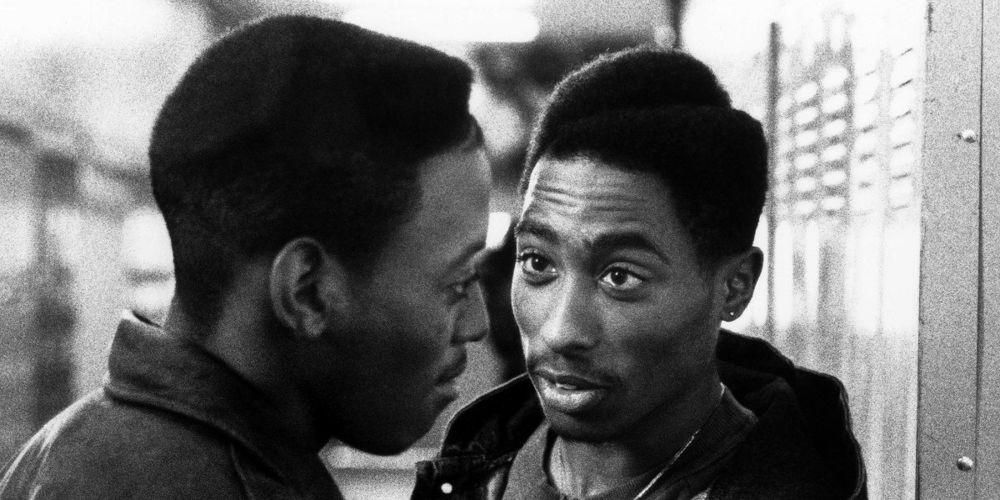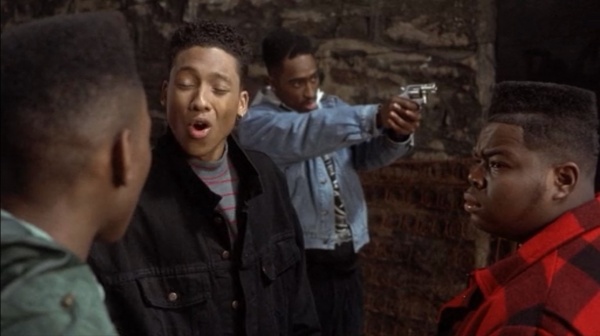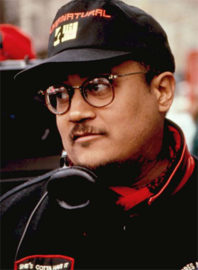
Getting to pick the brain of someone whose career you admire is always a special occasion…
With the release of Juice on Blu-ray for the very first time this past month it’s hard to believe that this story of four Harlem friends who spend their days together looking for a way to get the power and respect that they crave (aka Juice) is that old because it still feels as electric and relevant as it did back then.
I got the unique opportunity to sit down with noted director and cinematographer Ernest Dickerson about Juice which was his very first feature effort. We reminisce on memories from the set, talk about how long it took to get made, discovering unknown talent (like Tupac Shakur) it’s importance in the hip-hop community and so much more.
Dave Voigt: It’s been 25 years since Juice and I am curious to know what the origins and the desire in making this was for you especially coming off of a very successful career as a cinematographer working extensively with someone like Spike Lee?
Ernest Dickerson: We had actually tried to do this 8 years previous; it was eight years old by the time we finally got it going. We wrote it; Gerard Brown and I in the early 1980’s and we just couldn’t get any traction because at that time no one wanted to see that kind of film so we gave up on it and then my work as a cinematographer started to take off. It was only after my partner Gerard got a new agent who wanted to see more material and that’s when it really started to get some genuine traction with people interested in it. The journey had started 8 years earlier, but in this business sometimes those journeys do get interrupted.
DV: How was the process of going back through all this material? I am still very struck by how well the film really holds up after all these years.
ED: Thank you so much; well it was funny bringing back so many of these memories. You know I really can’t believe that it has been 25 years because going back through all the video of while we were shooting it and I’m reminded of how difficult it was to shoot because the weather just wasn’t cooperating with us at all and it was cold and raining but also the memories of working my four young actors (Omar Epps, Jermaine Hopkins, Khalil Kain & Tupac Shakur) who all did an exceptional job is really something that hit me too. The only one of them who had ever had any previous experience was Jermaine Hopkins, who did Lean On Me, but they all really stepped up their games and did a beautiful job, it’s really the memory of working with those guys that makes me feel proud.
DV: You did touch on this a little in the excellent special features on the disc but how important was it to find these unknown guys and do you think the film could have worked had it been cast with some more name actors?
ED: No, I really don’t think so because the personalities of any name actors really would have gotten in the stories way. I think the fact that no one had seen these four young men before made the entire thing all the more realistic and help to draw the audience in the story.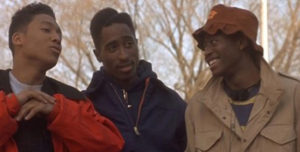
DV: You mentioned personality so I have to ask you about Tupac. The man was just so electric on screen and if I’m not mistaken he was still working on his first record at the time; is it like you said in the extras that he didn’t even come in to audition he was just there with someone else and you asked him to read?
ED: Yeah, he came in with Treach from Naughty By Nature. Tupac was just hanging out with him at the time and he really didn’t have any intention of auditioning at all but I asked him if he wanted to give it a try and he said “Yeah, why not?” It all went down in such a casual fashion but he really did an exceptional job of it and ultimately got the part. He captured the character of Bishop more than anybody else did who had auditioned for the role. He captured the pain that character had inside him and that’s why we got him.
DV: When you are casting something like this which was an independent production at the time, is it really found money when you find a guy like Tupac who ultimately does have some acting background and experience?
ED: Casting is always one of the most intense parts of the entire filmmaking process. I firmly believe that 85% of directing is in the casting. You really do have to put in the time to find the right people who can inhabit the roles that you’re going to ask them to take on so that they can bring them to life. It’s hours and hours of struggle and more than a few sleepless nights just not knowing if you are going to find that perfect person you just push through and push through and once you prevail you know that you’ve struck gold and found the right person for the job.
DV: The actual soundtrack aside, because there are so many iconic soundtracks from movies of the era but the score from the Shocklee Brothers was something that we hadn’t really seen in movies before and it stands out so much. For you how important was it working with them rather than a standard composer to give the film that much more of a feel of authenticity.
ED: I really do think that every film should have its own look and its own sound which obviously extends to the music and I just felt that the sound that Hank Shocklee put behind Public Enemy was the sound that I wanted for this film. And sure traditional scores work fine but I have always been a fan of using more experimental scores. I’m a big Ennio Morricone fan, also another experimental musician and I thought that this was a good way to try that in a film like this. I just felt that it would really provide more texture for Harlem as a location as well as more texture for the lives of these four boys.
DV: And it does not only in that perspective but by having people like Tupac and Queen Latifah in the movie because it’s a movie that is legitimately accepted and embraced by the community rather than a film that is TRYING to be embrace by the community.
ED: And that’s exactly what we were trying to do, we wanted to hit all the right buttons from beginning to end. We knew we wanted the film to be realistic and we really felt that was an effective way of doing it.
DV: What was it about the hip-hop artists of that era like Tupac and Queen Latifah who always seemed to be a little more on point and conscience about making movies and staying in the popular lexicon in the fashion rather than with artists today because there aren’t really any Lil Wayne or Nicki Minaj movies that people can talk about.
ED: I really think that comes down to the personalities of the people involved, but you know back in the 90’s hip-hop wasn’t nearly as corporate as it is today. The corporations have more or less taken it over at this point and it gets made at a faster pace with more of a real technical precision to it and I think it robs the music of some of its validity and charm, I think that might be it. Now that hip-hop really is in more of the mainstream then it was back then, it has lost some of the rough edges that gave it so much power back in the 90’s.
DV: You’ve also had a pretty extensive career shooting in TV as well and I am curious what the difference is for you between trying to mount an independent motion picture versus coming into something established, shooting a few episodes and then leaving?
ED: I did just make a feature called Double Play which had its premiere at the Rotterdam Film Festival with an international crew and cast but it’s getting harder and harder to get pictures off the ground these days and in order to keep working I’ve been doing television. Luckily I’ve been fortunate enough to align myself with some shows that actually want a filmmaker’s perspective on how that show should be done; mostly the cable shows. Stuff like The Wire, Treme, The Walking Dead, Bosch and even Dexter wanted more of a filmmaker’s perspective on it all. I’ve been very lucky and I like to look at a lot of the episodes that I have directed as mini, hour long movies. Obviously I’m not involved in creating any of that world because it is all done by the time I get there, characters are already established and the bulk of the casting is already done but for the most part especially with the cable shows it has become more and more important for them to have filmmakers and their perspective be involved in their process and that’s allowed me to keep it all going.
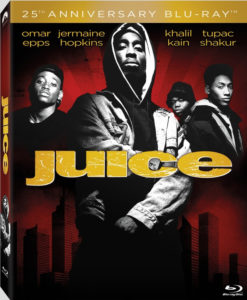 DV: Do you think that’s why we’ve had more of a “Golden Age of Television” that keeps getting touted these days BECAUSE these shows are taking more of a cinematic approach?
DV: Do you think that’s why we’ve had more of a “Golden Age of Television” that keeps getting touted these days BECAUSE these shows are taking more of a cinematic approach?
ED: Well now they can too. I really think that The Wire kicked that whole thing off as a serialized show that takes time in order to develop character. Plus, TV just isn’t a square little box anymore and so many people now have large flat screens and living rooms that are essentially screening rooms so you can put more cinematic values on the TV screen these days and have it all come across. You can put a character in this grand vista of a landscape and it comes across and is more successfully conveyed then it ever has been in the past thanks to the larger screen televisions that are so easily accessible these days. I really think that’s the great thing about television because it has in many ways become cinematic and it has allowed filmmakers another way of showing their stuff.
DV: In the past year or so not only with the release of Juice but also Demon Knight now available on Blu-ray how has it been for you to see these things generate new life with audiences, some who are seeing these films for the very first time?
ED: I’m gratified certainly because when we were making Juice (and this hold true for any movie really) all we were trying to do is make the best movie that we could. How it would be perceived 25 years down the road was never something that was ever even considered because you just can’t think like that in the moment while you are making it. I’m amazed and the fact that Juice is still incredibly relevant today shows that a lot of the problems that we were addressing are still there in society. Peer pressure has always been a major force for kids growing up and the fact that guns are so easily gotten here in the United States is a horrifying possibility, which continues to keep happening because you can get access to guns so very very quickly. The guys in the movie, Raheem got a gun which started a crime and set everything down its path and then Q got a gun. It’s actually kind of ironic because woman who plays the lady who gave the gun to Q is actually my mother. That’s my mom, she had just retired and she wanted to do some acting work so that was my way of getting her a SAG card. I grew up in Newark, New Jersey and I had later found out that a lot of the people who would stop by the house and visit were truly OG (Original Gangsters) so I figured she’d be able to handle herself around a bunch of people pretending to be OG in a story like this!
DV: Thanks again for the time today man and congratulations on everything.
ED: Thank you so much man.
Juice: 25th Anniversary Blu-ray is now available from all major retailers.

